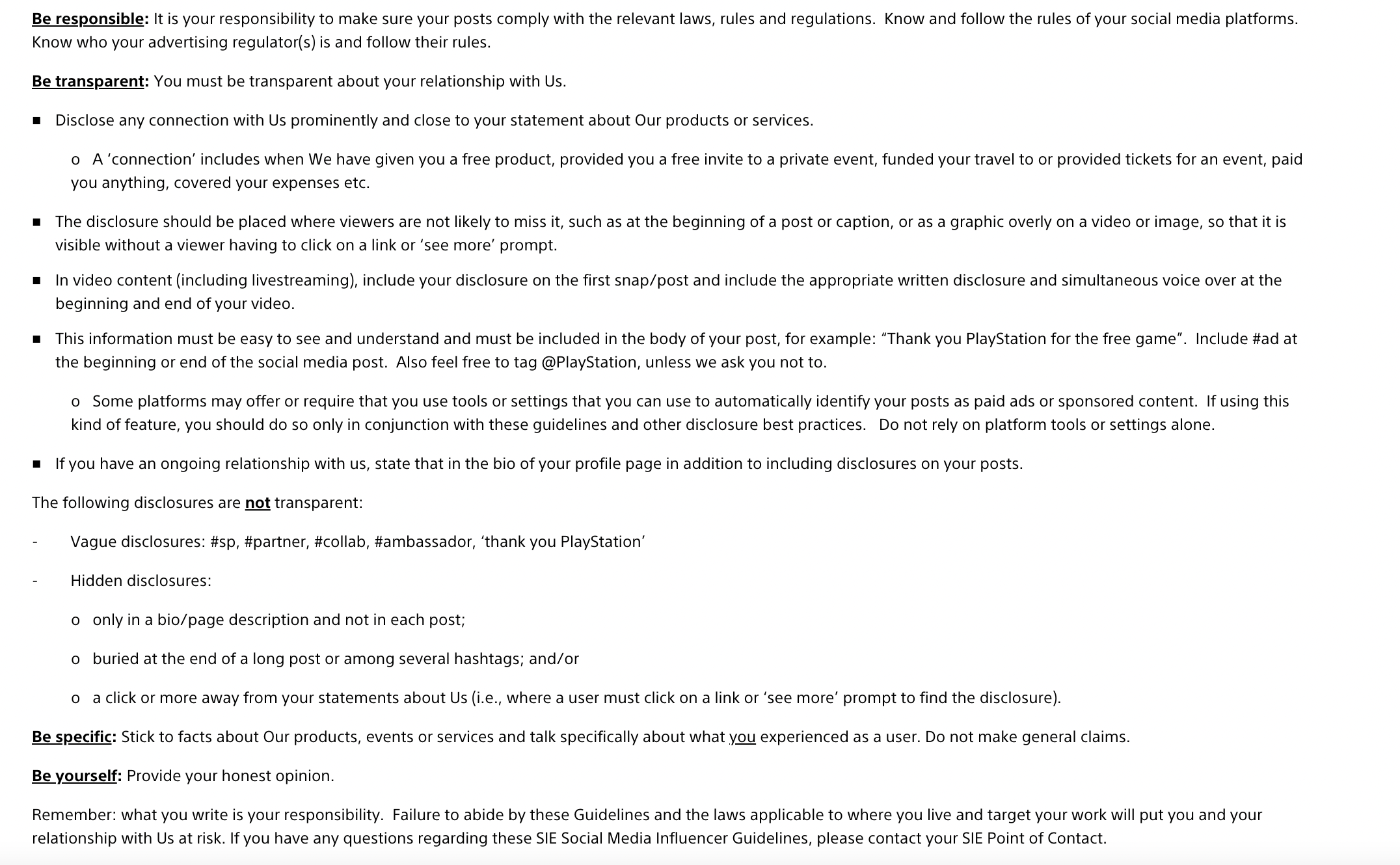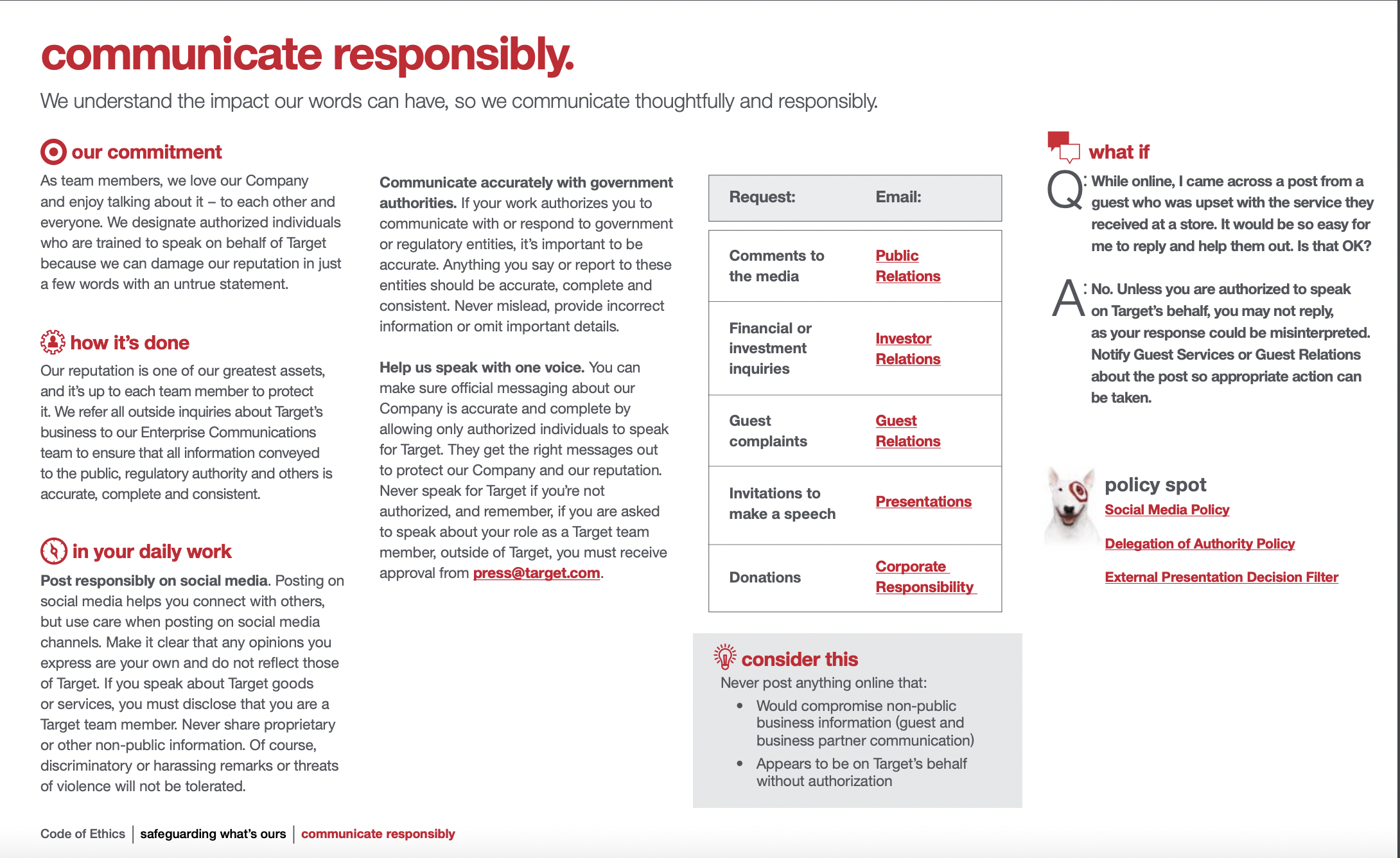
From snapping selfies with friends to tagging favorite brands in our Stories, social media has become a large part of our everyday lives. Consumers expect brands to have an active online presence and the ability to answer any questions they have fast.
But a poorly timed or worded social post could harm your brand reputation. Yet, 45% of companies don’t have a social media policy for employees in place.
Although people may forgive your brand, the internet never forgets, so it’s better to be safe than sorry! Implementing a social media policy will help protect your company and give employees the space to advocate for themselves while staying true to the brand and it’s values.
A social media policy is part of a company’s business code of conduct that tells employees how they should represent themselves and the brand on social media. It includes guidelines to protect the brand’s security, privacy and legal interests.
Social media platforms provide avenues for brand promotion, but they also present opportunities to misrepresent your brand, which is why a good social media policy is so necessary.
If you’d like to see how a social media policy is structured, download our free template.
Here are several reasons organizations should adopt a social media policy:
Social media policies allow you to unlock all the benefits of employee advocacy, without putting your brand credibility at risk.
When your employees post about the organization online, it can increase brand awareness, establish thought leadership and drive qualified leads. Along with helping social selling, employee posts can support social recruiting efforts, attracting top talent to your company.
Your social media policy is a critical advocacy tool, giving your employees the guidance they need to represent your brand accurately within social networks.
Brand diversity in social media is more important than ever. According to the 2023 Sprout Social Index, 21% of consumers follow brands on social because their values align with their own.
Amplifying diverse voices via social media is an actionable step brands can take to prioritize representation and attract top talent from marginalized communities. An inclusive social media policy will empower and encourage voices from all backgrounds to advocate for the brand.
A social media policy ensures that whenever someone interacts with your company online, either through a brand channel or an employee, they get the same consistent experience. This develops a more reliable, trustworthy identity for your company, turning customers into loyal fans and ambassadors.
Social media presents complicated considerations such as privacy law and copyright law. A well made social media policy will protect the company from potential lawsuits.
Consult with your legal counsel and outline a list of do’s and don’ts for the company to follow. These rules of thumb will help ensure the organization and contractors are compliant with laws, reducing the risk of legal action against the company.
There are many privacy and security risks involved with using social media. The larger your team is, the larger those risks become. A good social media policy combined with security protocols will protect your accounts against hacking, phishing and fraud accounts.
And since social media is a common resource for scammers and criminals, it’s imperative your social media policy includes guidelines that protect both your employees and company. Whether it’s defending against phishing scams or ransomware attacks, make sure that everyone in your organization is vigilant about online protection.
Many organizations make the mistake of waiting until they’ve faced a public relations disaster to put a policy in place. Be proactive and implement a strategy in advance to minimize crisis.
Your social media crisis plan should align with your social media policy. For example, the policy can designate which teams are responsible for handling a PR crisis.
A well-crafted social media policy will provide a variety of benefits, like empowering your staff and protecting your brand. But to relish those benefits, your policy needs to outline clear, comprehensive guidance.
Here’s some essential components every social media policy should have to get you started:
Explain why the organization uses a social media policy. Be transparent and illustrate why your brand needs it. Here’s an example from our social media policy template:

Emphasize how the social media policy applies to everyone from executives and managers to interns and freelancers. An example from our template is below:

Note how this section also provides the brand’s definitions of company-related information and social media. These clear distinctions ensure everyone within the organization is on the same page.
You can’t control everything your employees do and say on their personal social media accounts. However, it’s important to show them why their behavior on personal profiles affects your company and how they can avoid conflict.
Regardless of whether or not your employees are speaking for you, the world might view them as a reflection of your brand. If your employees are acting questionably online, this raises suspicion about your business too.
Your social media policy will have a list of rules to follow, but the most important thing to remind your employees is that whatever they say on social media, they’re representing the company—even when on their personal accounts.
Outline basic expectations for behavior. For instance, they need to:
It’s also a good idea to include a disclaimer on personal accounts to remind customers that your employee is an individual, not a spokesperson for your organization. Many social media policies ask team members to state all of their posts are based on their own opinions, like Best Buy:

By separating themselves from their employees’ opinions, Best Buy reduces their risk of a PR crises.
Your social media policy should also defend against security risks and privacy issues. Robust social media policies outline the dangers of sharing online and help keep your employees out of trouble.
At a minimum, these guidelines should include details about:
The safer your employees are with their social media actions, the more secure your business becomes.
Your social media policy must provide clear guidelines on how to handle sensitive areas, particularly regarding the law and industry regulations. Legal requirements vary by country and state, so make sure you consult with your legal counsel.
Your policy can cover, but isn’t limited to the following:
Clarify who can speak on behalf of your company on social media. A small problem could snowball if not handled appropriately. If someone leaves a negative comment about your brand online, make sure your employees know how to respond.
The degree of freedom you give your staff will depend on the nature of your business. If you do allow your team to offer advice to customers, it’s a good idea to train them on the following:
For some businesses, the best option will be to direct the situation toward the staff trained to manage PR matters and conflict resolution. You may have members of your team responsible for crisis response, message approval, customer service, public relations management and social engagement.

An excellent way to ensure conflicts are always handled properly from the start is to set up pre-approved responses to common issues in a social media management platform like Sprout Social. These responses show your brand is aware of their concern and will direct them to the right person to resolve the problem.
You can even use Sprout’s social listening tools to ensure you’re the first to know when someone says something negative about your brand. The faster you’re aware of a problem, the easier it is to fix it before the fire spreads.
If you’re looking for inspiration, many social media policies are publicly available. Here are a few great social media policy examples that are specific and comprehensive:
Dell’s social media policy is digestible, yet still meets the requirements of the company’s needs.
The policy is broken down into several sections: purpose and scope, related policies and consequences of violations, social media account ownership and Dell’s five social media principles.

Notice how Dell uses these sections to define expectations and ties the policy back to the company’s code of conduct and equal employment opportunity policy.
For example, Dell Technologies’ Five Social Media Principles mentions the guidelines are reiterated in onboarding. This section also lists zero-tolerance behavior, rules of thumb and specific steps to protect security, privacy and legal compliance.

Along with implementing a social media policy for employees, some brands create a separate policy for content creators and influencers. Playstation has a great social media policy for influencers.
Playstation begins by stating influencers must follow their rules whenever they post about Sony Interactive Entertainment products and services on any social media platform. Notice how they define collaboration as “free product, event tickets, or any other benefit or if you have an ongoing relationship with us.”

From there, Playstation lists specific guidelines that fall underneath four main principles: be responsible, be transparent, be specific and be yourself.
For example, under the “be transparent” section, Playstation lists how to disclose the relationship. They note the disclosure should be visible to viewers without having to click a link or a “see more” prompt. Influencers must include #ad at the beginning or end of the post. They also include caveats for video content:

Walmart has a comprehensive set of guidelines and is an excellent model for enterprise companies with sophisticated social media presence across several channels. The retailer breaks down guidelines for both customers and associates for Twitter, Facebook and Instagram.

The retail company states that no employee outside of the Walmart social team should answer customer complaints or questions directed toward the company. This kind of rule might seem restrictive, but it’s often best for larger companies to err on the side of caution.

Target also does a great job of breaking down their social media policy in a way that’s clear and easy to understand. Their policy begins with a purpose, definition of social media and policy application:

Their guidelines are brief, but provide specific dos and don’ts for employees to follow:

They include examples of potential policy breaches and best practices when using social media:

The retailer also includes a summary of the social media policy within their code of ethics, with actionable steps to follow for specific scenarios and forms of communication:

Social media is a powerful tool for your business, but it takes intention to enjoy its benefits. A social media policy will help guide employees across the organization on how your brand should be represented on social.
Social media in the workplace is manageable—you just need to dedicate time and effort into developing a social media policy that works.
Take control of your brand’s social identity by showing employees they have the power to deliver incredible results for your company. Give them the tools they need to best represent the brand and themselves by downloading our social media policy template.
Jamia Kenan is a Content Specialist for Sprout Social based in Atlanta, GA. When she’s not writing, you’ll find her talking about the Internet from the latest TikTok trends to NFTs and the metaverse. She also enjoys trying new restaurants, hiking and watching movies.
![[afterpost] 2024 Toolkit](https://media.sproutsocial.com/uploads/2023/10/2024-toolkit_2023_after-post-1.png)
Learn how Sprout’s Employee Advocacy program helps your business reach new and larger audiences on social media.
Schedule a Demo * No Credit Card Required
Recommended for you View all Recommended for you Recommended for you7 Steps to Launching an Employee Advocacy Program Your Team Wants to Participate In
The complete guide to create your employee advocacy content strategy
Published on August 29, 2024 • Reading time 8 minutesWhat is employee advocacy and does it really work?
Published on February 22, 2024 • Reading time 11 minutesAn Employee Spotlight Template for Celebrating Your Team